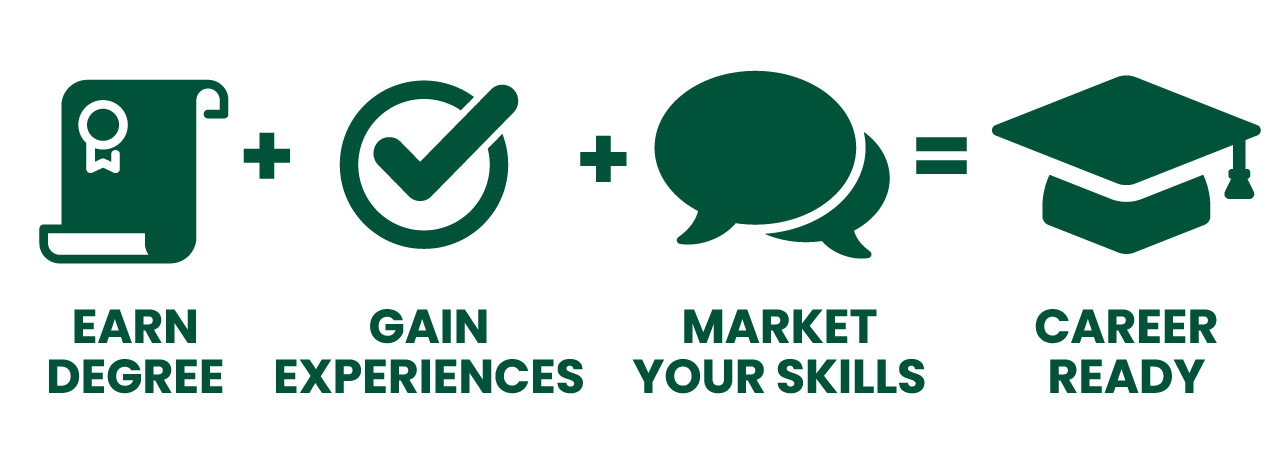Overview of Engineering
Engineering is a branch of science and technology focused on designing machines, structures, and systems. There are many disciplines within the field.

Electronics engineers design and test electronic devices from portable music players to global positioning systems, and computer hardware. They oversee device production and may install and maintain it as well.
Get details on the salary and job security of these Engineering careers:
Get Career Ready for Engineering
Find out what it takes to land a career in Engineering

Earn a Degree
To work in the field of Engineering, it is recommended you have a strong in math, science, or technology. Check the Mason Catalog for degree requirements.
Along with your degree, professional certifications like these may increase your employment options:
- The Engineer in Training (EIT) certificate is available to recent graduates and current undergraduate students in accredited programs.
- The USGBC provides LEED Certifications and continuing education to engineers focused on green design.
- The Project Management Professional certification is issued by the Project Management Institute.
- INCOSE Systems Engineering certification is a formal recognition of the knowledge and experience of systems engineers, regardless of where they may be in their career.
- Alison offers free certificate courses in mechanical, civil, electrical, and biomedical engineering.
- freeCodeCamp provides completely free programming and software engineering certifications, including Python, machine learning, and cybersecurity.
- Cursa offers free engineering and technical courses (mechanical, industrial, civil, robotics) with digital certificates available via mobile app.
- Class Central aggregates free courses from Coursera, edX, and more across all engineering disciplines, with some offering free certificates.
Specialized knowledge and training in these technical skills are in high demand:
- Network Security
- AutoCAD
- Agile
- MATLAB
- SQL
- SolidWorks
- Cloud Security
- Penetration Testing
- Generative Design
- DevOps Tools
- Machine Learning
Gain Experiences
Employers expect at least six to twelve months of related experience to be competitive for full-time positions. Gain experience while you are a student at Mason.
Here are the types of experiences most valued by Engineering employers, and where to find them:
Internships/Jobs
- Dice
- Handshake
- iHireEngineering.com
- Interstride (international opportunities)
Projects
- Faculty-sponsored research projects: Ask your professors about research projects.
- Capstone courses/Design projects: Consult your academic advisor about capstones in your department.
- Undergraduate Research Scholars Program (URSP): Get academic credit and financial support for research projects.
- Freelance/Independent projects (Example: Upwork or Parker Dewey).
Challenges & Competitions
- Forage (Participate in job simulations and employer challenges)
Market Your Skills
You need to be able to communicate the knowledge, skills, and experiences you have gained in and outside of the classroom.
Below are top ways to showcase your qualifications to Engineering employers:
Resume
Technical Interview
Online Portfolio
An engineering portfolio gives you the opportunity to demonstrate your skills and experience in a visual format. It can include sketches, engineering projects, graphics, diagrams, AV clips, a modified resume, and/or writing samples. Here are a few websites where you can create a portfolio:
Career Ready
George Mason grads have gone on to work for Engineering employers, such as:
|
ALA |
Northrop Grumman |
MITRE |
US Department of Energy |
|
Boeing |
Dominion Energy |
Leidos |
US Patent & Trademark Office |
|
Dewberry |
M.C. Dean |
Capital One |
Join the Engineering community
Get involved with academic and professional societies to grow your network while you're still a student.
Mason Student Organizations
For information on Mason student organizations affiliated with Engineering, please check Mason360 and your department for more information.
